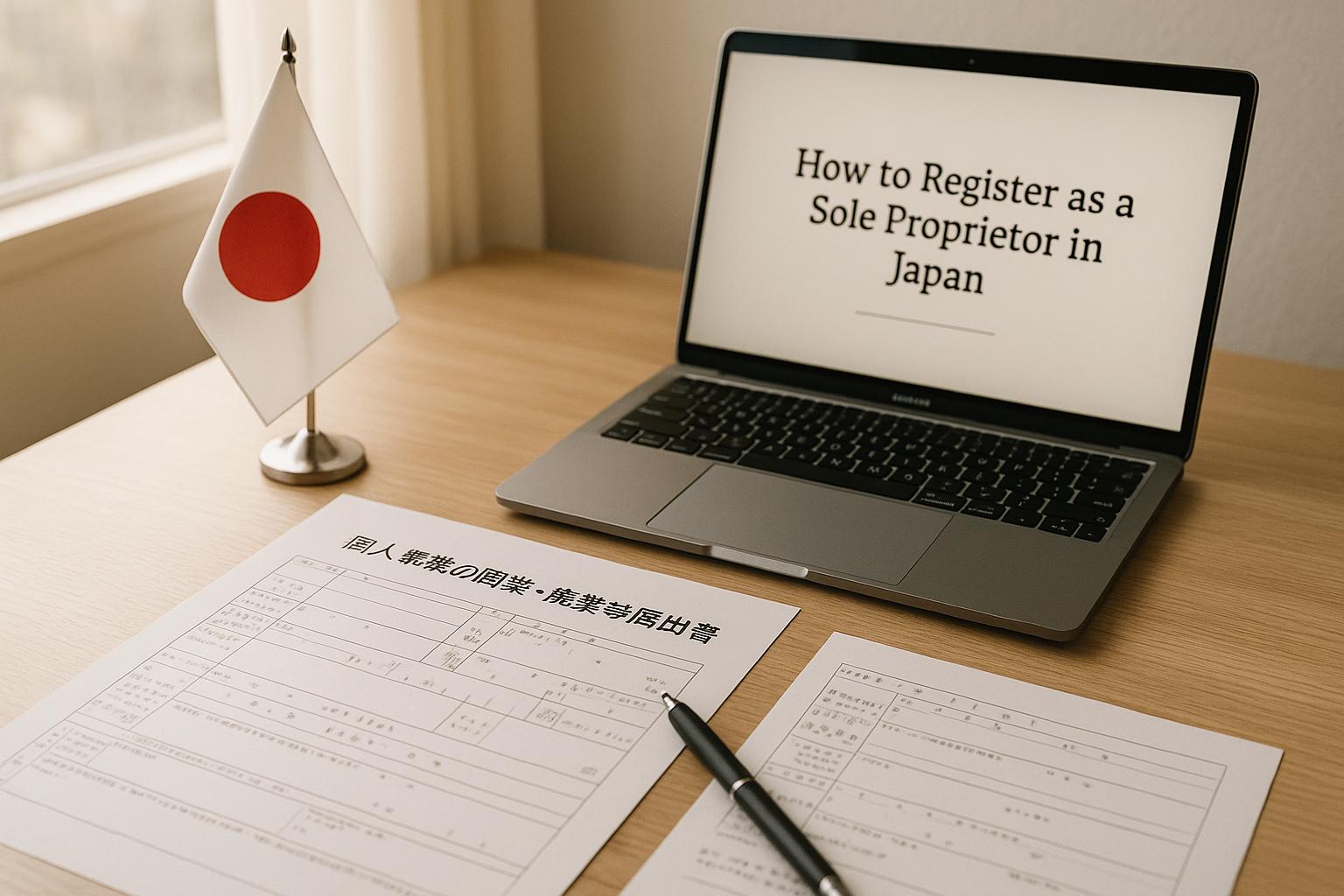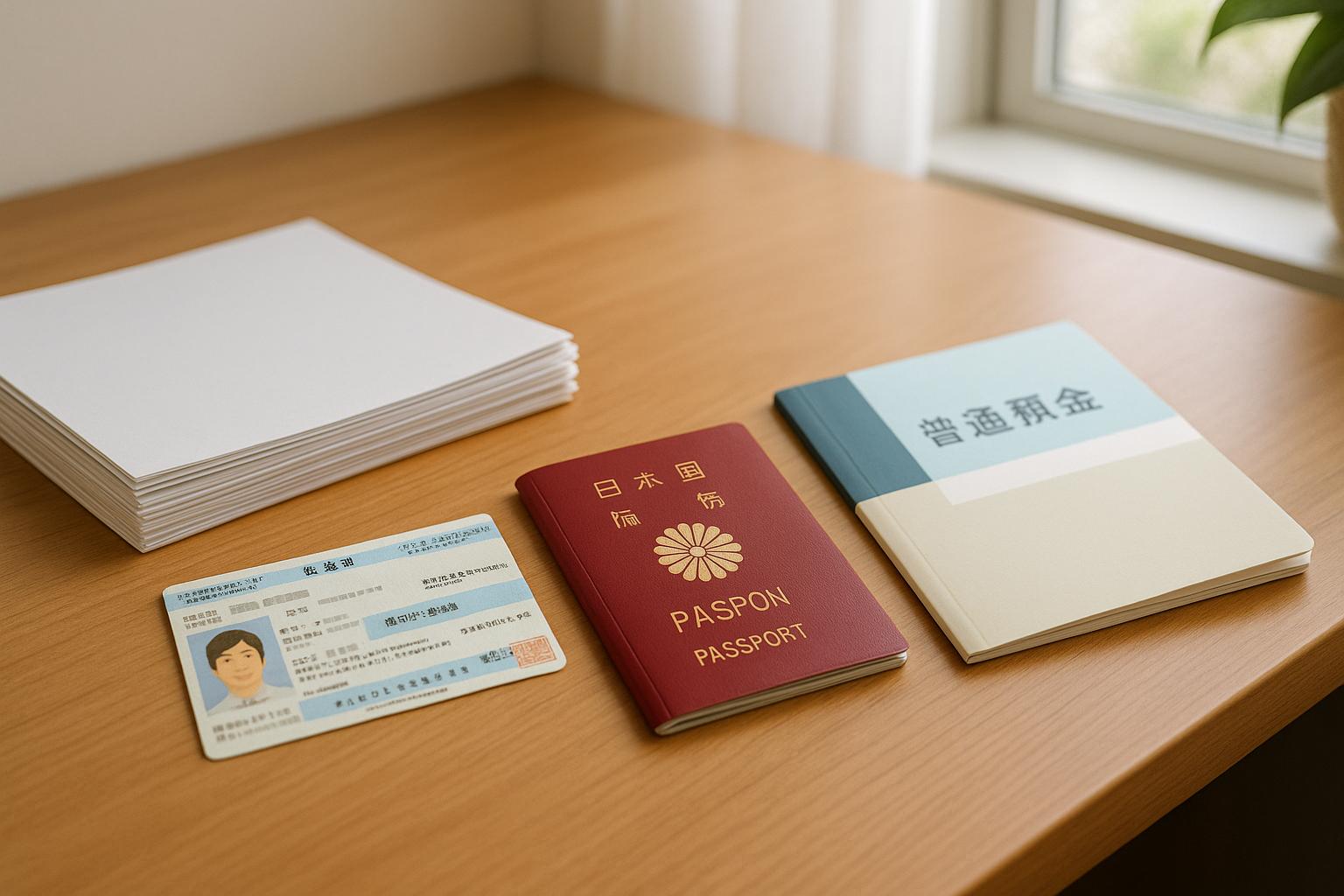Living in Japan with a pet can be expensive, especially when it comes to veterinary care. Unlike Japan’s public healthcare for humans, pet healthcare relies on private insurance or out-of-pocket expenses. For expats, pet insurance is a smart way to manage unexpected costs and ensure access to quality care. Here's what you need to know:
- Why it matters: Veterinary bills can be expensive, with annual costs averaging ¥45,000 for dogs and ¥24,000 for cats. Pet insurance can cover up to 90% of treatment costs, depending on the plan.
- Costs: Premiums typically range from ¥5,000 to ¥10,000 per year. However, most policies don’t cover preventative care like vaccinations or routine checkups.
- Language support: Many Japanese providers operate in Japanese only, but some, like Anicom and ipet Insurance, offer English-speaking support.
- Top providers: Anicom (from ¥2,500/month) and ipet Insurance (from ¥2,600/month) are popular local options with direct billing and English support. International providers may offer broader coverage but come with higher premiums.
Key takeaway: Choose a provider based on your pet’s needs, budget, and whether you prefer local or international coverage. Understanding exclusions, reimbursement rates, and waiting periods will help you avoid surprises.
How to Choose Pet Insurance in Japan
When looking for pet insurance in Japan, it's important to focus on factors that cater specifically to expats. While there are plenty of options available, not all providers are equally suited to the unique needs of foreign residents. Pay close attention to language support, coverage specifics, and legal requirements to find a policy that works for you and your pet.
Language Support Options
One of the first things to consider is whether the insurance provider offers English-language support. Many companies in Japan operate exclusively in Japanese, which can make things tricky when filing claims or dealing with emergencies.
Check if the provider offers English-speaking customer service for inquiries and claims. Some companies may not even have English versions of their websites, which can make it hard to understand the policy terms, exclusions, or how to submit claims.
To assess their support, try contacting them directly. Ask specific questions about coverage limits, how to file claims, and the renewal process. Once you're confident the language barrier won’t be an issue, you can move on to reviewing the coverage itself.
Coverage Details and Limits
Knowing what your insurance policy covers - and what it doesn’t - is crucial. Coverage can vary widely depending on the provider and the plan you choose. Take the time to compare options carefully.
Most plans cover veterinary fees, treatment costs, and microchipping. Some also include liability insurance for incidents like your pet biting someone or causing injury. Policies often reimburse up to 90% of costs exceeding ¥30,000, which can be a lifesaver for expensive treatments.
When evaluating plans, consider your pet's age, breed, and any pre-existing conditions. Plans with broader coverage tend to have higher premiums, while basic plans with fewer benefits are more affordable. Opting for a higher deductible can lower your monthly premium but may increase your out-of-pocket costs. Also, check if the policy guarantees renewability, even if your pet develops a chronic condition.
Legal Requirements and Policies
Understanding Japan’s legal requirements for pet ownership is another key part of choosing the right insurance. Staying compliant with these regulations ensures you can maximize the benefits of your policy while avoiding unnecessary complications.
For dog owners, registration is mandatory once a dog reaches 90 days old. Expats should register their dogs at the local ward office within 30 days of moving in. The process typically costs around ¥3,000, and your dog must wear the identification tag provided during registration at all times.
Annual rabies vaccinations are also required for dogs. While the fee for this is relatively low, it’s a legal necessity. Japan is a rabies-free country, so strict controls are enforced for all imported animals.
Microchipping is another requirement for dogs and cats sold by breeders or pet shops, costing between ¥5,000 and ¥10,000.
Cat owners face fewer legal obligations. Cats don’t need to be registered with local authorities, but keeping them up to date on vaccinations is highly recommended - especially if you might need to travel with your cat on short notice.
Finally, review policy documents carefully to understand exclusions, waiting periods, and any limitations. If anything is unclear, contact the provider directly to get answers. A thorough review will help you choose coverage that aligns with both Japan’s regulations and your pet’s specific needs.
Best Pet Insurance Providers for Expats in Japan
Pet insurance isn't widespread in Japan, which can make finding reliable coverage tricky for expats. However, some companies cater to expats with English-speaking support and policies designed to meet their specific needs. Below are some of the top options to consider.
Anicom
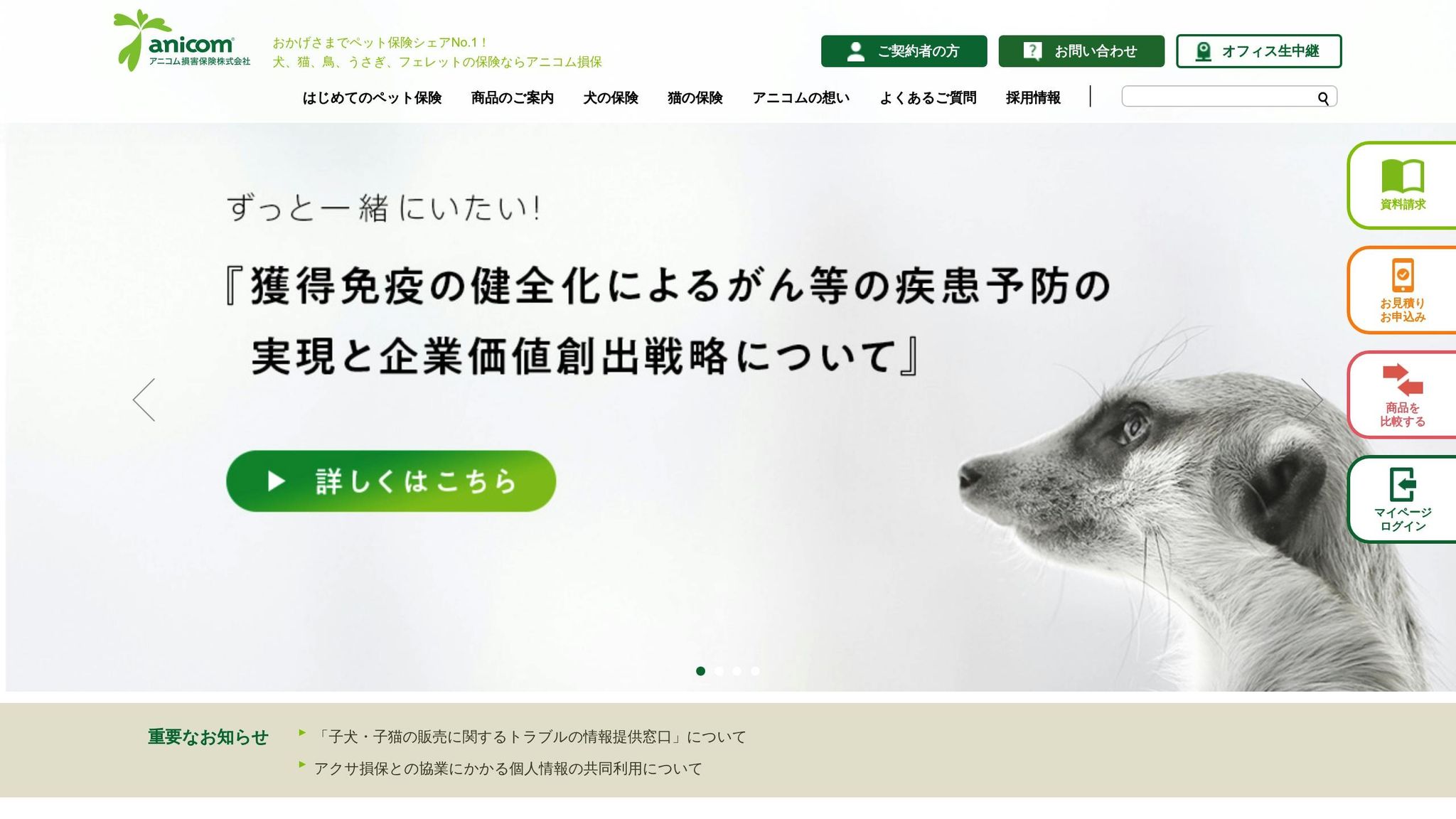
Anicom is a major player in Japan's pet insurance market, holding about 44% of the market share. It boasts a network of 6,700 partnered veterinary clinics across the country, making it a convenient choice for expats who might need care in unfamiliar areas.
One standout feature is Anicom's "OTC settlement system", which works similarly to Japan's National Health Insurance. This system allows for direct billing with partnered clinics, so you're not stuck paying the full cost upfront and waiting for reimbursement later. Depending on your plan, Anicom reimburses either 50% or 70% of veterinary expenses. Monthly premiums start at ¥2,500, and the company also offers wellness plans. It has received a 4.8/5 rating in 2024 based on online reviews. Importantly for expats, Anicom provides English-language support for inquiries and claims.
ipet Insurance
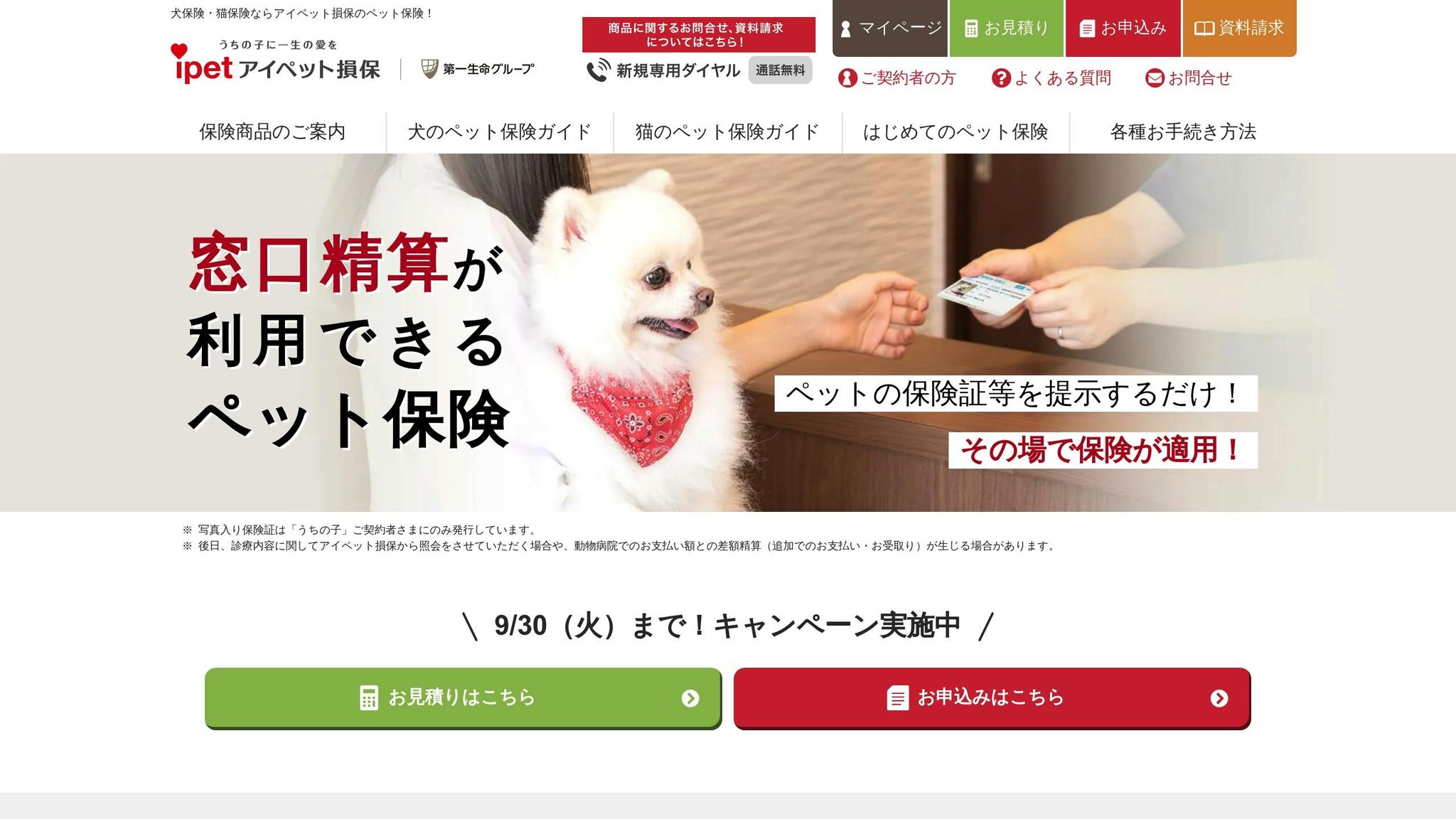
ipet Insurance takes a digital-first approach, offering a user-friendly mobile app that simplifies the claims process. Monthly premiums start at ¥2,600, with reimbursement options of 50%, 70%, or 90%. The company includes coverage for cancer treatments and holds a 4.6/5 rating in 2024.
Like Anicom, ipet is one of the few companies in Japan that offers OTC payout settlements at participating clinics. This means you can benefit from direct billing instead of paying upfront and filing for reimbursement later. ipet also provides English-speaking customer service, making it easier for expats to navigate their policies and claims.
International Providers with Japan Coverage
For expats who need coverage that extends beyond Japan, international providers offer global portability. For example, IMG partners with Fetch to provide pet insurance with English-first customer service, making it a familiar option for American expats.
Unlike many Japanese insurers, which often exclude preventative care, international providers frequently include subsidies for wellness and preventative treatments. This can be especially appealing to expats used to more comprehensive policies from their home countries. Additionally, these providers are well-equipped to handle expat-specific needs, such as travel-related requirements, temporary relocations, and coordination with international veterinary networks.
That said, international coverage tends to come with higher premiums compared to local Japanese options. Ultimately, your choice will depend on your priorities. Local providers like Anicom and ipet offer extensive networks and cost-effective plans within Japan. Meanwhile, international providers stand out for their portability and strong English-language support, catering to expats with global mobility.
Pet Insurance Provider Comparison
When selecting a pet insurance provider, it's essential to weigh factors like costs, coverage, and support services. Below is a breakdown of top expat-friendly options to help you decide.
Provider Comparison Chart
| Provider | Monthly Premium | English Support | Reimbursement Rate | Highlights | Notable Exclusions |
|---|---|---|---|---|---|
| Anicom | From ¥2,500 | Yes | 50% or 70% | OTC settlement system | Preventative care excluded |
| ipet Insurance | From ¥2,600 | Yes | 50%, 70%, or 90% | Mobile app claims, OTC settlements | Preventative care excluded |
| Axa Direct Japan | From ¥2,900 | Limited | 50% to 80% | Broad coverage including preventive care | Varies by plan |
| International Providers | Higher premiums | Extensive | 70% to 90% | Global portability, wellness coverage | Exclusions vary by policy |
This chart highlights the main differences, but here are some deeper insights to guide your decision-making process.
Key Considerations
Premiums and Reimbursement Rates
Anicom offers the lowest starting premium at ¥2,500 per month, but its reimbursement caps at 70%. On the other hand, ipet Insurance charges just ¥100 more monthly but covers up to 90% of eligible expenses, which can significantly reduce out-of-pocket costs for expensive treatments.
Billing and Claims
Both Anicom and ipet Insurance provide direct billing options, eliminating the need for upfront payments - a major convenience in emergencies. ipet further simplifies claims with a mobile app for paperless submissions. Most claims across providers are processed within 5 to 10 business days, though timelines may vary depending on the complexity of the claim and supporting documentation.
Coverage Scope
Japanese providers like Anicom and ipet focus on accidents and illnesses, typically excluding preventative care such as vaccinations and routine check-ups. On the other hand, international providers often include wellness and preventative care, which can be especially beneficial. For context, pet owners in Japan spend an average of ¥300,000 annually on dogs and ¥160,000 on cats.
English Support
English support varies widely. While Anicom and ipet Insurance provide dedicated English-language assistance, Axa Direct Japan offers more limited support. International providers generally excel in this area, catering to expat needs with extensive language services.
Choosing the Right Provider
Your choice will depend on your residency plans and priorities. If you're staying in Japan long-term and value affordability with a strong local network, Anicom or ipet Insurance could be ideal. However, if global coverage or wellness benefits are a priority, the higher premiums of international providers might be worth the investment.
sbb-itb-cbc0cbb
Pet Insurance Tips for Expats in Japan
If you're an expat navigating pet insurance in Japan, a few practical steps can make the process smoother and ensure your furry friend gets the best care possible. Here's how to simplify things and make informed decisions.
Finding English-Speaking Vets
Finding a veterinarian who speaks English can be a game-changer. Online directories and expat forums are great starting points. Some well-regarded clinics to consider include Hanegi Animal Hospital in Setagaya, Komazawa Animal Hospital, HALU Animal Hospital in Shibuya, and Akasaka Animal Hospital.
Before visiting, call the clinic to confirm they provide English-language support and accept your insurance. As Progressive points out, "Pet insurance doesn't have networks, and most will reimburse you for covered costs from a licensed vet". This flexibility means you can focus on finding the best care for your pet.
Another tip: prepare your pet's medical history in English ahead of time. If you're concerned about specific symptoms or behaviors, recording a short video can help the vet understand your concerns more clearly. Once you’ve chosen a clinic, make sure you’re fully familiar with your insurance policy to avoid surprises.
Reading Policy Terms
Understanding the details of your pet insurance policy is crucial to sidestepping unexpected expenses. Policies in Japan often come with unique exclusions and limitations, so it’s important to read the fine print carefully.
Start by reviewing exclusions. Many Japanese providers, such as Anicom and ipet Insurance, typically don’t cover preventative care like vaccinations, routine check-ups, or wellness treatments. If the policy is in Japanese, consider translating the document to confirm these details. Pay close attention to waiting periods, renewability terms, and reimbursement caps.
- Waiting periods: These often range from 14 to 30 days for illnesses, while accidents may have shorter waiting times. Pre-existing conditions are usually not covered.
- Renewability: Some policies offer lifetime renewability, which can be especially important if your pet develops a chronic condition.
- Reimbursement caps: Make sure you know the maximum amounts your policy will cover and how reimbursement rates are calculated.
If anything is unclear, don’t hesitate to reach out directly to the insurance provider. Many have English-speaking representatives who can explain policy details and answer your questions.
Using Myjin for Pet Services
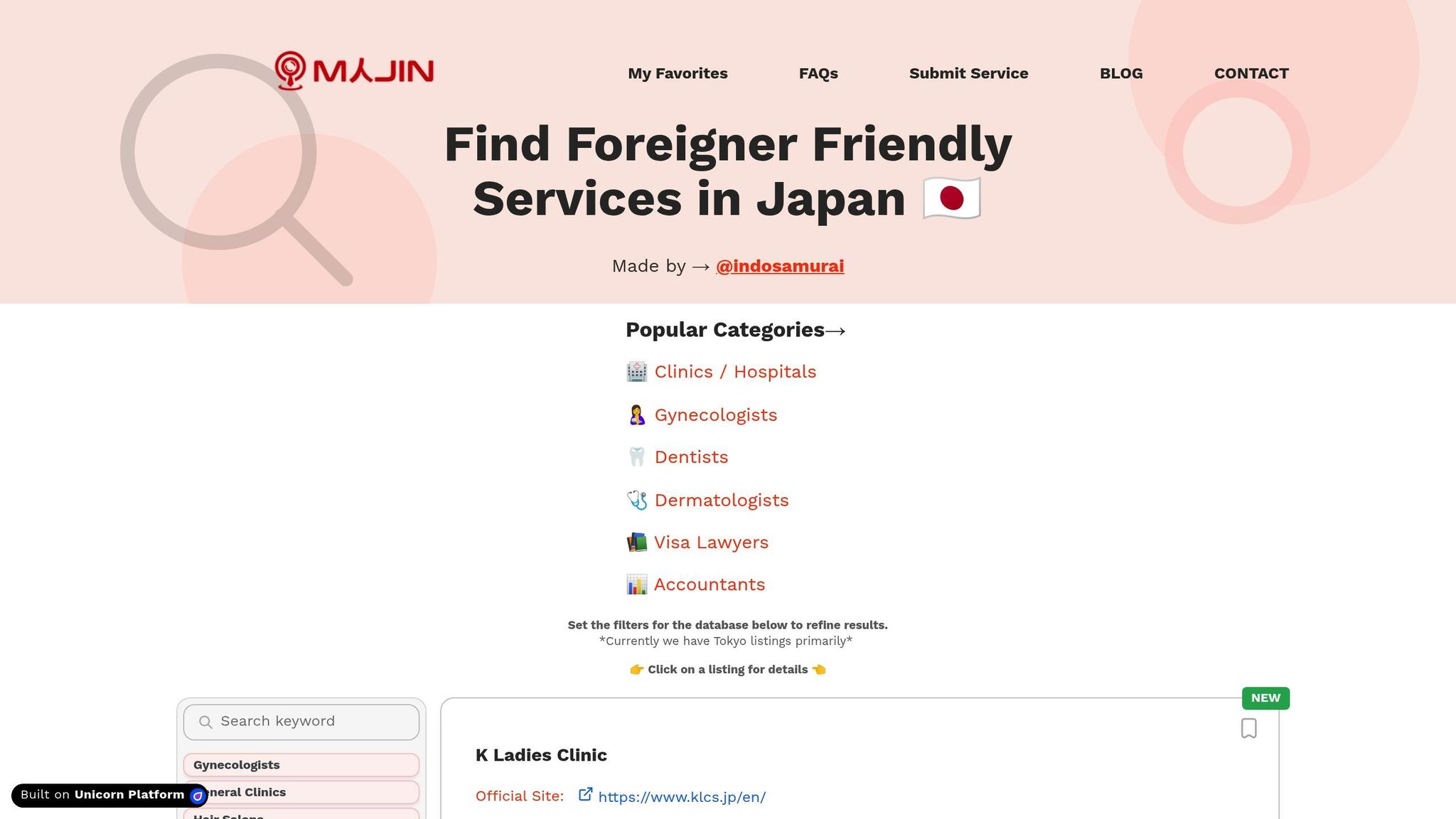
Pet care in Japan goes beyond just insurance and vet visits. For a broader range of services, Myjin is a trusted directory that connects expats with English-speaking service providers. Whether you’re looking for pet sitters, groomers, or other essential services, Myjin can help you find reliable and foreigner-friendly options.
When researching pet insurance providers or veterinary clinics, you can take inspiration from Myjin's approach. Look for providers with verified contact details, clear language support, and transparent service descriptions. Building a network of dependable, English-speaking service providers is a key step in making pet ownership in Japan stress-free.
Conclusion
Picking the right pet insurance as an expat in Japan doesn’t have to be complicated. With veterinary care costs often being substantial, it’s no surprise that around 40% of dog owners and 20% of cat owners in Japan already have pet insurance. It’s a smart way to shield yourself from unexpected expenses while ensuring your furry companion gets the care they need.
Look for an insurer that offers English support, comprehensive coverage, and affordable premiums. Anicom Insurance stands out with its extensive network and smooth claims process, while ipet Insurance impresses with its user-friendly mobile app, making managing your policy a breeze.
On average, pet insurance in Japan costs about ¥10,000 per year and can cover up to 90% of expenses exceeding ¥30,000. However, keep in mind that routine care, like vaccinations and check-ups, usually isn’t included. It’s a good idea to set aside separate savings for these preventative expenses. Planning ahead not only helps financially but also ensures your pet’s well-being is never compromised.
As one expert aptly put it, “Pets aren’t just animals - they’re part of the family”. This sentiment highlights the importance of protecting them. Start by finding an English-speaking veterinarian, familiarize yourself with your policy’s waiting periods and exclusions, and don’t hesitate to reach out to your insurer’s English support team if you have questions. With nearly 20% of respondents becoming new pet owners in Japan since 2020, you’ll be joining a growing community of expats who’ve embraced pet ownership in the country.
Taking steps to invest in your pet’s health not only safeguards them but also brings you peace of mind. By comparing providers, understanding the details of each policy, and selecting coverage that suits your budget and your pet’s needs, you can confidently provide the care they deserve.
FAQs
What should expats keep in mind when choosing between local and international pet insurance in Japan?
When choosing pet insurance in Japan, there are a few key factors to keep in mind, especially for expats. Your pet’s age, breed, and health history play a big role in determining both the cost and the type of coverage available. Local insurance providers often offer plans that are more affordable and better aligned with Japan’s veterinary practices. On the other hand, international providers might be a better fit if you’re planning to travel frequently, as they can offer broader and more flexible coverage.
Another crucial point is whether the policy includes routine checkups and vaccinations - these are often excluded, so it’s worth double-checking. You’ll also want to look into the network of veterinary clinics associated with the insurance provider. Having access to a nearby clinic can make a huge difference when your pet needs care. Finally, take the time to review the policy’s terms and pricing. Monthly premiums can vary significantly, typically falling between ¥2,000 and ¥10,000, depending on the level of coverage and your pet’s specific needs.
How can expats in Japan understand pet insurance policies written in Japanese?
Expats living in Japan can make sense of Japanese pet insurance policies by using trusted translation tools to translate documents into their preferred language. Many insurance companies also provide English-speaking customer service, which can be incredibly helpful for understanding policy specifics and addressing any concerns.
It’s also a good idea to engage with local expat communities or participate in online forums. These spaces often offer practical advice and firsthand experiences from others in similar situations. To make the process smoother, look for insurance providers known for offering services tailored to expats, such as bilingual support. This ensures you can clearly grasp the terms and coverage options before committing to a policy.
What legal requirements should expats in Japan know about when getting pet insurance?
In Japan, owning a pet involves adhering to specific legal obligations. For instance, dog owners are required to register their pets with the local government, and annual rabies vaccinations are mandatory for dogs older than 90 days. Since 2022, there’s also a requirement for microchipping newly acquired pets, such as dogs and cats. Additionally, leash laws must be observed when in public areas.
Although pet insurance isn’t a legal necessity, it’s strongly advised to manage veterinary expenses, which can vary widely depending on the type of care. Another option to consider is third-party liability insurance, which can cover any damages your pet might cause - though this remains optional. Understanding and following these guidelines ensures a more responsible and hassle-free experience as a pet owner in Japan.
